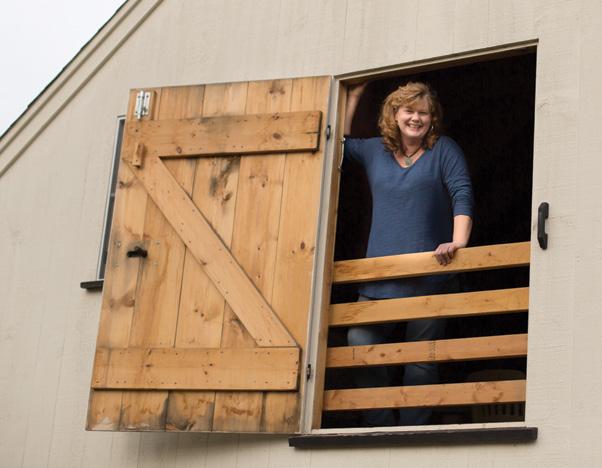
4 minute read
Alumni Highlight
photo by Shira Friedman
SIMPLE PLEASURES Patti and Allan Popp Create a Farm
Advertisement
Al Popp ’86
Starting a farm was not on the radar for Patti (Silk) Popp ’86 when she was a student at ND. “I did think about becoming a teacher, but I really focused on having fun,” she admits. “We had such a tightknit group, a real sense of community.”
Not surprisingly, it’s recreating that sense of community that has made Sport Hill, the Easton farm that Patti and husband Allan Popp ’86 created, so successful.
Patti and Al knew each other at ND, but it wasn’t until a serendipitous evening at Bridgeport’s Captain’s Cove years after graduation that they began dating. At the time, she was working for an orthopedic surgeon and he had a landscaping business.
In 2000, with two small children, they bought property in Easton and decided to clear it for farming. Their expertise? “Well, I used to help my grandparents in their garden. Same with Allan,” Patti laughs. But they both liked working with their hands and felt confident they could carve a living out of the earth. “It was a painful first few years. We cleared the land of trees and stumps, built retaining walls, composted. We had to learn the seasonality of produce. Honestly, I thought you planted seeds once and they grew all year.” The truth, they found out, wasn’t quite that simple.
“You have to get into the rhythm of the land and cycles of weather and understand successive planting. And you learn that what grows well on the farm up the street might not grow well on your property,” explains Patti.
Today, the Popps grow corn, tomatoes, popcornon-the-cob (“Some of the best stuff I’ve ever eaten in my life!”), lettuce, kale, broccoli, peppers, and cauliflower. They raise pigs and chickens. Sport Hill is a sustainable farm; that is, the Popps farm using techniques that protect humans, animals, and the environment. They plant a variety of crops and rotate them, which is better for the soil and optimal for flavor. “The pigs can roam, and the chickens are pasture grazed. We give the pigs vegetable scraps rather than feed,” Patti explains.
“It’s important for me to know where my food is sourced,” says Patti. At left, the Sport Hill Farm market.

photo by Patti Popp

photo by Shira Friedman
It’s obvious that a great deal of business creativity goes into making a small family farm profitable these days. Sport Hill Farm has had a Community Supported Agriculture (CSA) program for 11 years; it began with 20 families, and is now up to 200. Members pay up front for produce, then take a leap of faith. In the growing season, they get a variety box of whatever produce was harvested that week. Sport Hill partners with Fairfield’s Unquowa School, providing produce for their sustainable lunch program. The farm also runs a summer camp, four weeks of hands-on learning to get kids in tune with dirt and bugs and weather. “It’s a great way to disconnect them from the Internet, and I’m finally getting to teach,” says Patti.
There’s a market right on the property, which sells Sport Hill’s produce as well as breads, cheeses and fruit sourced from other sustainable, local farms. And they participate in a couple of weekly farmers’ markets, like the one in Black Rock that was founded by Karyn Duda Leito, another classmate from the Class of ’86.
“Al and I are passionate about good food, and our customers are, too,” Patti says of the regulars who frequent the market. were attending a Farm to Table dinner, an event Patti had been looking forward to. “Suddenly, I went deaf in one ear and felt a rush of fluid across my forehead,” Patti recalls. “I had the worst headache, and told Al I had to go home.” She thought it was a migraine, but customers warned Al to get her to the emergency room. Twenty-four hours after her headache began, she was told she had a ruptured aneurysm; after surgery, Patti was in the hospital for a month.
“The doctors couldn’t believe I was walking and talking,” she says. “I believe it was God and the fact that I’m in good shape that saved me.”
Luckily, Patti has had no residual physical effects from the scare, but the ordeal has changed her in other ways. “I had panic attacks for a year, but I had so much support, so many prayers from the community. And it’s burned an even greater passion in me to eat well and to share that passion.” Their customers understand this, she says.
“Our farm is a community, and our customers are people who are willing to seek us out for better food,” says Patti. “We built this from nothing and it’s been hard work, but I’m very proud of what we’ve done.”




